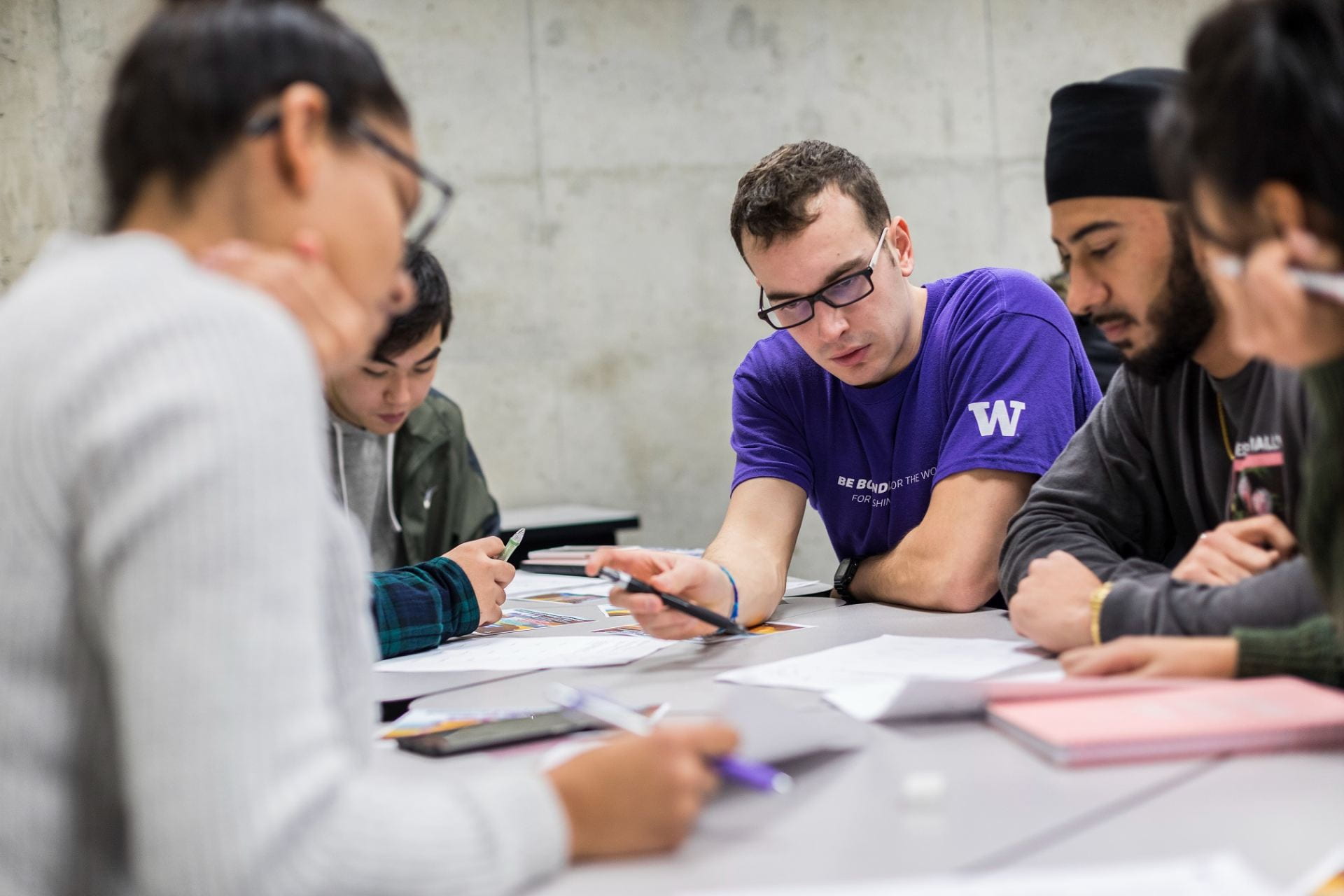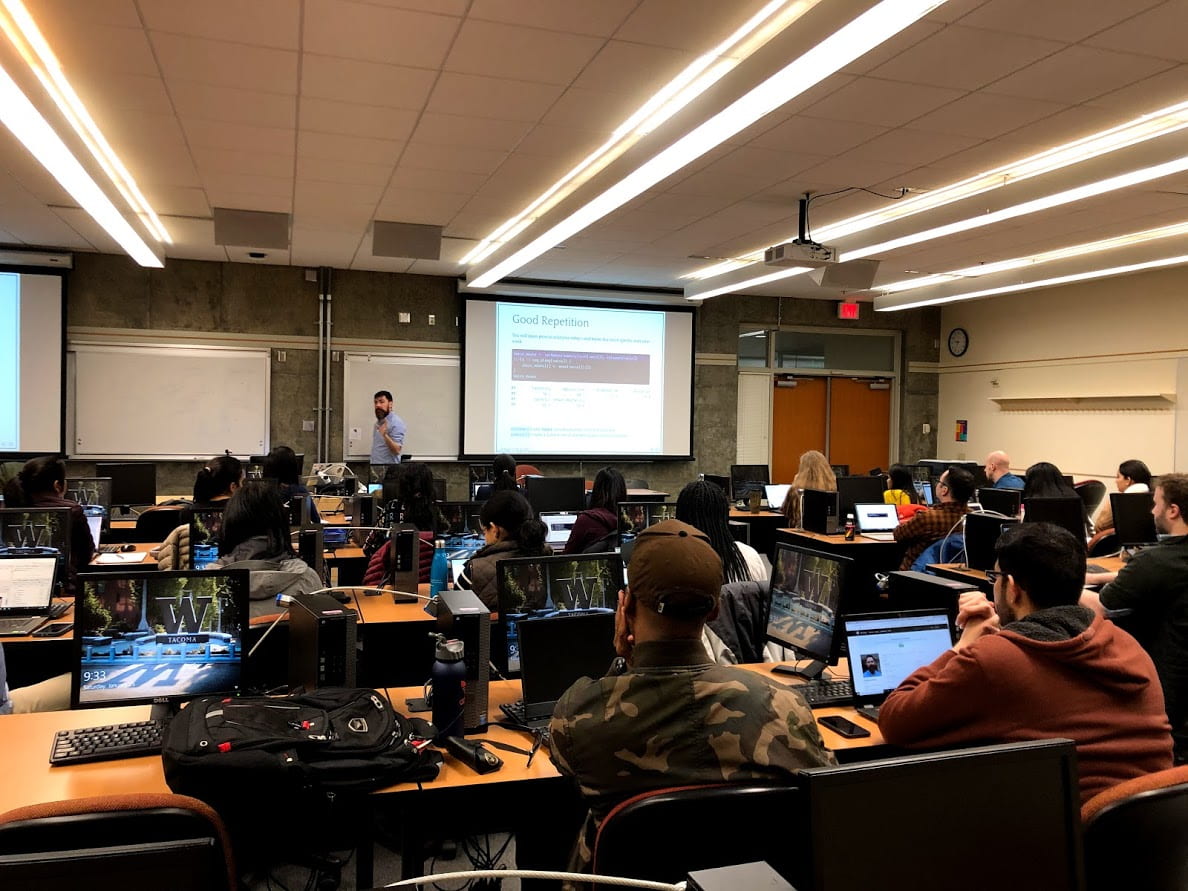Intersecting Business and Academics
Community INDUSTRY & Academia Partnership
Projects
We aim to increase impact and awareness through research, education and service, and drive engagement at the intersection of business and academics. If your business or organization has a challenging problem to solve or is seeking data-driven insights, the Center for Business Analytics at the Milgard School of Business wants to partner with you. You are invited to benefit from a team of advanced data analytics students, researchers and practitioners working on an important actionable project for your organization.
Calling for Applied Project Proposals for AY 2025-26!
Does your business have a challenging problem to solve? Are you seeking data-driven insights about your organization? If so, submit your project proposal before the application deadline, June 13, 2025. We look forward to co-creating value with you!
Students-as-Analytical Thinkers & Adaptive Innovators
Students have the unique ability to bring creativity, fresh insights, and innovative approaches towards achieving concrete business outcomes. Students-as-Analytical Thinkers & Adaptive Innovators (= Work-based Learning) was created to help organizations co-create opportunities that engage our students and researchers as consultants on existing business problems or for cultivating new opportunities, while improving the processes and performance of organizations with data, analytics, design, and service thinking. These live consultative projects typically include data collection, analysis, demo, service/digital transformation plans and recommendations. Under the direction of Milgard faculty advisors, teams of three to six students use T-shaped strategic thinking, adaptive innovations, operational excellence, complex problem solving, creativity, and teamwork skills to tackle an organization’s challenges and create value-added services.
BENEFITS TO ORGANIZATIONS
-
- Leverage fresh student insights and receive help applying new, innovative approaches
- Opportunity to gain a fresh approach to an industry problem
- Access non-exclusive commercial licenses to any IP developed by diverse student teams or UW employee through the project
- Have access to students and graduates who will have the most current knowledge and skills (e.g. business analytics, data science)
- Gain insight into student skills and knowledge for more efficient and effective recruitment
- Strengthen community ties to the Milgard School of Business and the University of Washington Tacoma
- Great opportunity for professional development in leadership and/or project management for industry mentors
- Provide Milgard School students valuable, career-relevant experiences in applying classroom skills to address real world problems
NON-DISCLOSURE AND CONFIDENTIALITY
- All project information will be kept confidential in-class environment unless permission for release is obtained from the client
- Some clients may request team members to sign the client’s non-disclosure agreement to ensure that commercially sensitive projects are treated with full confidentiality
- Confidential information includes all data, reports, records, trade secrets, verbal communications, and/or other materials obtained from the client both prior to and subsequent to the duration of this course
- The Student Consultants, Faculty Advisors and Alliance Partners shall not use or exploit the confidential information for any purpose other than for education and completion of the course
- All information provided to the student team is held confidential, to be shared only within the classroom setting

4 programs, 4 different ways of partnership
1. Twelve month-long Applied Projects by Master of Science Business Analytics (MSBA) students
Organizations provide a project proposal for a team of 3-6 students in the Master of Science in Business Analytics program, under the direction of UW Tacoma Milgard Faculty Advisors.
2. Short-term Applied Projects by CBA Researchers & Practitioners
3. Applied Projects by Analytics Innovation Student Club
4. Community Innovation Programs (Community of Practice)
Beginning in June concluding late May, MSBA student teams will work on a comprehensive business analytics and digital transformation assignment or project in 4-phases. Each consultant dedicates five to six hours per week and uses the skills they have developed through specialized course work from the class “Applied Project: Analytics & Digital Transformation Lab.” The main objective of the Applied Project is to create a setting in which students can apply the advanced concepts, theories and frameworks encountered in the MSBA program in an integrative fashion, and they can demonstrate their distinctive knowledge and skills to solve existing business problems or cultivate new opportunities, and improve the performance of organizations through live consultative projects that typically include data collection, analysis, demo, digital transformation plan and recommendations.
How it works
1. Organizations submit a project proposal
2. CBA team reviews the project proposals
3. Teams of 3 to 6 students are matched with a project
Students are matched with a project based on their interests, background, and skill set.
4. SIGNING AGREEMENTS/CONTRACTS
5. Student teams work on their projects throughout the year and report to the organization Regularly
With the help of their technical and faculty mentors (see the MSBA Applied Project Advisors), students work on the project in 4 phases:
- Phase 1 – Discover: concentrates on industry, market and organization analysis to discover opportunities for data and analytics enabled digital transformations (e.g. Business Intelligence & Analytics Strategy, Goals & Objectives, Business Process Analysis, Scope Definition)
- Phase 2 – Plan: concentrates on processes performed to analyze, scope and plan the problem (e.g. Descriptive & Diagnostic Analytics)
- Phase 3 – Develop: concentrates on the analytics-enabled transformation with collection, storage, analysis of data and development of digital solutions (e.g. Predictive & Prescriptive Analytics/Machine Learning)
- Phase 4 – Deploy: concentrates on processes performed to prototype and lessons learned, analyze findings, recognize ethical dilemmas and social responsibilities (e.g. Cognitive Analytics & Smart Apps)
Student teams consult with your organization while conducting research and developing deliverables. Project work will also include continuous project reviews and status updates, as well as the delivery of a final written report and oral presentations to clients.
6. Students showcase their work at the annual Applied Project Showcase event.
The culmination of students’ hard work is showcased through live demo/poster style sessions open to public viewing. Each team is represented and able to discuss the analytics methodology followed to co-create the digital solution, specifically highlighting the tools and techniques they used to discover, plan, develop and deploy their working prototype analytics solutions.
To ensure confidentiality, company-specific information is not shared. The showcase specifically highlights methodologies, tools, and techniques students used during their projects.
What do we need from our partners?
Project Proposal and Scope
Your organization will identify a problem, challenge, or opportunity to be addressed by the project team and submit their project proposal.
When you are defining the proposal, please note that the projects need to result in applied recommendations and implementation plans with some amount of measurable benefit and cost analysis.
Your project proposal will include the following:
- Company/Organization name
- The day-to-day contact from your firm (name, position, phone and e-mail)
- The project’s executive sponsor (name, position, phone and e-mail)
- Brief back
ground information about your organization
- Statement of purpose and scope (problem, challenge, or opportunity to be addressed by the project)
- What you hope to gain from an MSBA team (what would you like to find out or have accomplished?; what is the desired deliverable?)
- Some key tasks the students will perform to complete the project
- Available resources to complete the project (access to data, software, hardware, and support from staff, etc.)
- Any risks or assumptions that may be relevant to the project
Time
- Assigning a key associate to act as the project coordinator and be readily accessible to the students to make sure students have access to the people and internal information they need to do the project
- Identifying an executive sponsor for the project
At the end of the project, students will be given an opportunity to give a final presentation to the senior management (sponsor/champion) of this project.
Cost
Fair Pay Compensation Model:
While we expect that our partner organizations will provide reimbursement for nominal out-of-pocket student expenses (e.g., mileage, tolls etc. for project-related travel) we do not charge an up-front project fee to our partners for our students to work on these projects. Rather, we believe in a Fair Pay Compensation model whereby our partner organizations define what they would be willing and able to contribute to the Milgard Center for Business Analytics for a successful project outcome at the end of the project. We will continue to provide pro bono applied projects this year for those organizations unable to make a financial contribution given the current economic environment.
In your proposal, please consider what amount your organization is willing to contribute to the University of Washington Tacoma Milgard Center for Business Analytics if the project deliverable and experience meet your expectations at the end of the project in May. These funds are used to support future analytics projects, research & education in our community, and students’ academic & professional development.
Please note that contributions at the $15,000 level and above will be recognized with access to our graduating MSBA students and alumni that are seeking internships and full-time employment in the region. With permissions of students, we will be able to provide to the organization a resume packet and an invitation to meet our MSBA graduates and alumni in June during an in-person networking event at UW Tacoma.
Note: UW Tacoma assesses an additional 5-10% transaction and overhead fee depending on the type of funding model used to support the Milgard Center for Business Analytics (Gift = 5% OR Academic Educational Support = 10%). Please contact Michael Turek at mcba@uw.edu if you have questions about overhead fees and what funding model works best for your organization.
Examples of problems or opportunities that our student teams can work on
Marketing / Sales
- What do consumers want to buy and how much are they willing to pay?
- Where and when do consumers want to make a purchase?
- Keeping consumers loyal
- Creating a virtual marketplace
- Recovering and sustaining market growth
Supply Chain & Logistics
- Anticipating and preventing future inventory problems
- Designing more responsive supply chain networks
Healthcare
- Optimizing the utilization of surgical operation resources
- Managing estimated revenue and risk resulting from the Hospital Value Based Purchasing
- Analyzing opportunities for consolidating surgical specialties to specific locations
- Strategizing growth and investment for robotics programs in healthcare
- Forecasting surgery volume for seasons
Finance
- Measuring financial performance and assessing the value of intangible capabilities
- Creating a balanced portfolio of metrics as a strategic management system
Human Resources
- Retaining top talent in an organization
- Determining the bottom line impact of staffing decisions
- Analyzing how salary relates to personnel performance
- Determining the economic impact of a region-specific workforce
Engineering / Operations
- Maximizing yields
- Predicting equipment malfunctions before they occur
- Optimizing and growing a robotics capabilities
Utility Services & Public Services
- Predicting when and how customers will use the service
- Encouraging small businesses to establish themselves in a city
Insurance
- Profitably insuring customers in high-risk categories
- Detecting fraudulent behavior
- Optimizing rate structures
Our Analytics Innovation student club works on a number of pro-bono data analytics projects to co-create value for the community.
The Analytics Innovation Club has created projects with these partners:
- Korean Women’s Association
- Washington State Economist
- Washington State History Museum
- ISSIP -International Society of Service Innovation Professionals
- IBM
- Pacific County, Washington
- Tacoma Pierce County Chamber
- JBLM
We strongly believe in and foster the value of community and open innovation, and are in the process of establishing a number of community of practices. These communities bring together people and organizations who share a concern, problem, or passion about a topic, and who deepen their knowledge and expertise in the field by interacting on an ongoing basis. We operate as “learning and action systems” where we connect to solve problems, share ideas, set standards, build tools, and develop relationships with peers and stakeholders. Currently, we have the following Community of Practices:
Economic Impact Analysis Program (EIAP)
Data Analytics for COVID-19
Ready to submit your Project Proposal?
We look forward to co-creating value with you!
Thanks for your interest in submitting a Project Proposal for an Applied Project. Please click on the link and submit your project proposal for review.
Need more information?
We’re here to help!
For more information, please contact Michael Turek, Associate Director of the Center for Business Analytics, to express your preliminary interest regarding project opportunities.



